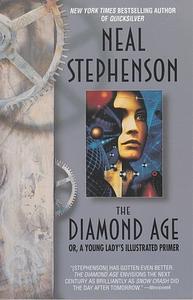You need to sign in or sign up before continuing.
Take a photo of a barcode or cover
I was ready to give five stars, but the ending eluded me. The Fists and the Drummers are tossed in haphazardly and neither storyline resolves in any satisfying way. However, the world in this book was so amazingly crafted that I felt immersed and invested in what happened to every character.
Neal Stephenson never fails to captivate my attention, and Diamond Age is no exception. In this version of our near future, nationalism has been replaced by affiliation groups of choice, and the ability to conjure matter out of energy has made hunger a thing of the past. Against this backdrop, we follow the story of Nell, a young girl with no prospects that chances upon something that changes her life forever.
Stephenson, with his usual wit and lush prose, delves into the questions of class, entitlement, evolution, and creativity. He explores the ideas of nurture versus nature, and the ways that comfort can make us soft. Is it necessary to face early challenges in order to develop the drive to maximize our potential? He explores the ideas of cultural evolution and asks the question, where is it that we are going at such a breakneck pace?
I would recommend this book to anyone who enjoys contemplating what new technology means in the face of human and cultural evolution. Neal Stephenson has a wonderful way with words, and his imagination keeps the storyline interesting and surprising. If you haven't read his work before, this would be a great place to start.
Stephenson, with his usual wit and lush prose, delves into the questions of class, entitlement, evolution, and creativity. He explores the ideas of nurture versus nature, and the ways that comfort can make us soft. Is it necessary to face early challenges in order to develop the drive to maximize our potential? He explores the ideas of cultural evolution and asks the question, where is it that we are going at such a breakneck pace?
I would recommend this book to anyone who enjoys contemplating what new technology means in the face of human and cultural evolution. Neal Stephenson has a wonderful way with words, and his imagination keeps the storyline interesting and surprising. If you haven't read his work before, this would be a great place to start.
adventurous
challenging
dark
mysterious
medium-paced
Plot or Character Driven:
A mix
Strong character development:
Yes
Loveable characters:
No
Diverse cast of characters:
Yes
Flaws of characters a main focus:
No
I binged a little on Stephenson a year or so ago, so it was nice to get back to him. Interesting story, well-written. Definitely a winding plot, but made it back together in the end. Took a while to get into, but ended up engrossed in the story, especially Princess Nell's adventures.
Engaging story. Really interesting concepts. Gets a bit weird, but what good sci-fi doesn't, I suppose?
The Diamond Age is a book that is written in several different styles about several different ideas. It feels long, expansive, meandering and thoughtful. This creates an exhausting read due to sections that could have been easily cut from the overall product. However if you accept the book as an interesting walk through an enormous garden with no distinct theme, you might find yourself enjoying the book for the experience in and of itself.
Themes in the book I noticed:
- What is subversion, and how do you learn to be subversive
- Intelligence vs education
- Working through trauma
- Trauma is an invaluable--yet tragic--source of education
- Society in a world where countries are no longer necessary (social ties can be freely formed and broken at will)
Themes in the book I noticed:
- What is subversion, and how do you learn to be subversive
- Intelligence vs education
- Working through trauma
- Trauma is an invaluable--yet tragic--source of education
- Society in a world where countries are no longer necessary (social ties can be freely formed and broken at will)
adventurous
challenging
medium-paced
dark
emotional
reflective
slow-paced
Plot or Character Driven:
Character
Strong character development:
Yes
Loveable characters:
Complicated
Diverse cast of characters:
Yes
Flaws of characters a main focus:
Complicated
To appreciate this book, you need to get through the first 100 pages. Stephenson builds a fairly original and complex world during this first fifth of the novel. You’ll be lost at times, understanding the words but not their relation to the story. However, it will all make sense eventually—until it sometimes stops making sense. It’s complicated.
I experienced something similar with Snow Crash, although the world made sense a bit quicker in that novel than in The Diamond Age. Once the different elements align and the relationships between characters, locations, and events become clearer, I started really enjoying the book and understood much of what had happened before. Tricky author Stephenson! But he knows how to reward his readers most of the time. He can be a little “style over substance” at times, with too many rabbit holes for him to send us down to showcase his storytelling chops. This is especially true after the 50% mark in the novel, where I often found myself thinking, “Do I really need to know all these tiny details about this world? I’ve got enough to imagine them in my own way.” But I guess Stephenson had a very precise idea of how this world should look, leaving little to the imagination.
That being said, Stephenson also tackles very important and difficult themes. For example, his depiction of child abuse is very vivid, and I was quite moved by it. There is also a reflection on how privileged people interact with poorer ones and the cycle of violence and scarcity that affects them. It’s done in a clear but not too on-the-nose way, using this imagined future to discuss our own—something I always find interesting in sci-fi. That being said, the imagined future is close enough to our reality that it doesn’t take much effort to understand what he’s getting at. It does remove a bit of the “magic,” but it’s a fair trade, I guess.
In the last third of the book, I found the chapters to be wildly unequal in quality. Some are amazing: tight, efficient, with deep emotional impact. Others show Stephenson’s tendency to indulge in fanciful writing. It’s a shame, as it distracts from the core of the novel.
It’s a bit frustrating. Stephenson has the writing talent, imagination, skill, and thoroughness, but he seems too in love with his own writing, which I find a bit tedious and detrimental. At a certain point, it doesn’t serve the story and lacks balance. The last 100 pages or so are quite afflicted by this. There are some remarkable and bonkers action scenes, but the whole thing becomes convoluted and sometimes confusing.
Although I enjoyed this book and found it stimulating, relevant, and brilliant at times, it won’t rank as high in my evaluation as I feel it should have. It should be in my top ten, among those 4.5-5 star books that I recommend to anyone, but it falls short of that.
Just not the right time for me to read the book when I have other books to read. One of my first sci-fi books.





